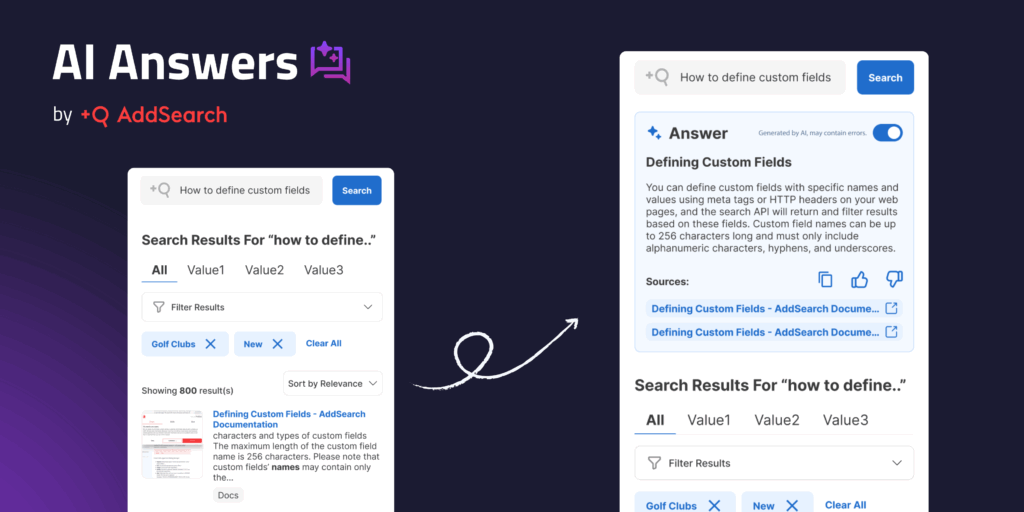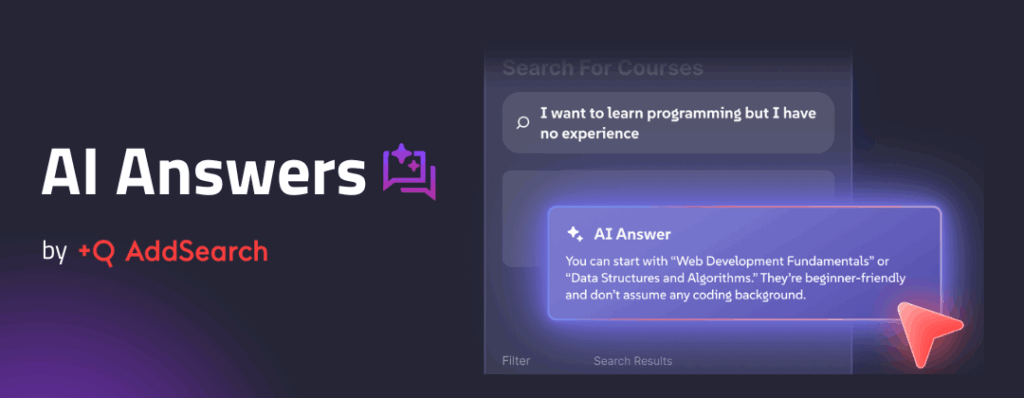When customers land on your website, they’re usually looking for something specific. How easily they find it often determines whether they stay, convert, or leave frustrated. Seamless onsite search experiences have become essential to building trust, loyalty, and driving conversions.
Modern site search technologies have evolved well beyond basic keyword matching. Today, advanced solutions — like AddSearch — offer features such as typo tolerance, autocomplete, synonym recognition, and intelligent ranking, helping users find relevant results faster and more intuitively.
This evolution matters. Following the global pandemic, the digital shift accelerated dramatically. Consumers, students, and businesses turned to online platforms for essential services, shopping, education, and entertainment. As a result, user expectations around speed, relevance, and convenience skyrocketed.
According to Think with Google, 53% of users will abandon a site if it takes longer than three seconds to load. And research from the Baymard Institute shows that poor site search still ranks among the top usability issues driving ecommerce friction.
Real-World Frustration Example: consider users urgently searching “refund policy for canceled flights,” but meet with outdated travel blog posts or general FAQ pages instead of a clear answer. Poor search experiences like these drive user abandonment
However, even the best keyword-based systems sometimes face challenges when handling complex, natural-language queries — the kind of open-ended questions users increasingly ask today. That’s where AI-powered Answers comes in, adding another layer to the search experience by providing direct, context-aware responses drawn from your site content.

In this post, we’ll break down how modern traditional site search and AI Answers differ, when each shines, and why using both together can dramatically improve onsite experiences.
Understanding Traditional Site Search
Traditional site search remains a cornerstone of the user experience — especially when visitors know exactly what they’re looking for. Whether it’s a product name, or a service page, structured search gets them there quickly with minimal effort. And when it works well, it delivers results: according to Salesforce, site search users are 6.4 times more likely to convert than those who don’t use it.
Strengths of traditional site search include:
● Quickly retrieving results based on keyword matches.
● Minimal user effort for direct lookups.
● Familiar, consistent interaction patterns.
It also shines when content is organized into clear categories or filters. Users browsing product catalogs, support sections, or multi-level menus often rely on search as a direct navigation tool rather than a question-answer exchange. This makes traditional search invaluable for ecommerce sites, and large institutional websites.
But as user behavior evolves, so do their expectations. Increasingly, visitors ask open-ended or conversational questions. A query like “how does your subscription plan compare to competitors” or “is this service covered by insurance” may not align cleanly with a keyword search approach. While advanced site search can retrieve relevant content, it still presents a list of links and not the direct, synthesized answer users may expect.
That’s where AI Answers steps in to complement ,rather than replace, traditional search — handling the edge cases that keyword logic can’t easily resolve.
Exploring AI Answers
AI Answers approaches search differently from traditional keyword-based models. Instead of relying purely on exact matches, it uses semantic search techniques to interpret the meaning and intent behind a user’s query.
Before AI Answers can generate responses, a critical foundation is laid: your website’s content is fully indexed. This indexed content becomes the trusted source from which AI Answers draws information.
When a user submits a query through the search field, AI Answers processes the question using natural language processing (NLP) techniques to understand its context and intent. It retrieves relevant pieces of indexed information and synthesizes them into a concise, accurate response — often accompanied by references back to the original source page for transparency.
If traditional search is like flipping through a site map or table of contents — showing you where things are but leaving you to dig — then AI Answers is like having a smart assistant who’s already read it all, pulls the exact passage you need, and points you to the source in case you want to double-check.
Key strengths of AI Answers include:
- Understanding context and nuance, not just literal keywords.
- Synthesizing information from multiple pages or documents.
- Handling conversational, complex, or exploratory queries smoothly.
- Displaying direct answers alongside traditional search results for a fuller search experience.
- Offering customization options to tailor the answer display and behavior to your website’s design and needs.

While traditional search excels at structured browsing and known-item lookups, AI Answers fills the gap when users phrase queries like real questions or need quick, synthesized insights.
Together, they create a comprehensive, intuitive onsite experience that meets users where they are — whether they’re browsing, searching, or asking.
Comparison: Advanced Site Search vs. AI Answers
| Feature | Advanced Site Search | AI Answers |
| Primary Focus | Quickly retrieves relevant pages or products based on keyword search. | Synthesizes concise, direct answers from indexed content. |
| Best for | Known-item lookups, browsing categories, structured content navigation. | Answering natural-language questions, complex or exploratory queries. |
| User Experience | Familiar list of search results to browse and filter. | Immediate, direct response with references to full content. |
| Strengths | Fast, predictable, supports browsing and filtering behavior. | Understands nuance, summarizes across multiple documents, reduces user effort. |
| Display Style | List of pages/products ranked by relevance. | Short synthesized answer shown alongside traditional results. |
| Error Tolerance | High (handles typos, synonyms, autocompletion). | High (interprets phrasing variations, context-aware matching). |
| Ideal Use Cases | Ecommerce catalogs, support knowledge bases, product/service discovery. | FAQs, policy clarifications, troubleshooting, Documentation |
How Site Search and AI Answers Work Together
When it comes to helping users find what they need, no single search method covers every situation. That’s why Advanced Site Search and AI Answers work best as a team — each solving a different part of the user journey.
Site Search excels when users know roughly what they’re looking for. It powers fast, predictable discovery: locating a product, browsing a service, navigating structured categories. With features like typo tolerance, synonym recognition, and custom filters, advanced site search turns browsing into a seamless experience.
AI Answers steps in when users ask natural, conversational questions — the kind that don’t map neatly onto a product catalog or site hierarchy. Instead of forcing users to dig, it pulls and synthesizes the right information from your trusted site content, delivering clear, direct answers.
Together, they meet users exactly where they are — whether searching, browsing, or asking. Here’s how it plays out:
- A customer might browse a product catalog using traditional search — then ask, “What’s your return policy if the shoes don’t fit?”
- A student could search a university’s degree programs — then ask, “When’s the application deadline for financial aid?”
- A healthcare patient may search doctors by specialty — then ask, “How do I update my insurance?”
By combining both approaches, you’re not just making search easier. You’re building trust, reducing friction, and future-proofing the entire user experience — no matter how expectations evolve.
Real-World Applications
Across industries, combining Advanced Site Search and AI Answers meets users where they are — helping them find, explore, and get clarity without friction.
Higher Education:
Prospective students navigate course catalogs, campus life pages, and tuition calculators through site search. When deeper questions arise — “What’s the scholarship deadline for international applicants?” — AI Answers steps in, providing fast, reliable answers that reduce barriers to applying.
Healthcare:
Patients use site search to find doctors, locations, or specialties. When they have administrative or urgent questions — “How do I update my insurance before my visit?” — AI Answers provides actionable steps without forcing them to dig through dense FAQ pages.
SaaS and Customer Support:
Software users search documentation libraries to find setup guides and troubleshooting articles. AI Answers complements this by quickly answering operational questions like “Can I upgrade my plan mid-cycle?” or “How do I reset my password?” — reducing ticket volume and support frustration.
Travel and Hospitality:
Travelers browse destinations, deals, and hotels using structured search tools. But when specific policies matter — “Do I need a visa for X?” or “What’s the cancellation policy for prepaid bookings?” — AI Answers gives them instant clarity, helping close bookings faster.
Important Considerations for AI Answers
Introducing AI-powered answers into your website experience can be transformative — but getting it right takes a little planning. Here are a few important things to keep in mind:
Content quality is everything.
AI Answers only works with the material it can retrieve. If your site’s content is outdated, inconsistent, or incomplete, even the best AI system will struggle to deliver helpful responses. Regular content audits — not just technical updates — keep your answers accurate and trustworthy.
Linking back to source material matters.
Users need to feel confident that the answers they get aren’t “made up.” Clear links back to original pages build transparency, allow deeper exploration, and reinforce your site’s authority.
Not all questions are created equal.
AI Answers handles many natural-language queries well. But for highly technical topics, legal policies, or edge cases, clear site documentation is still essential. The better your foundation, the better the answers.
Keep your content fresh.
Think beyond annual updates. Refresh your indexed content frequently to reflect changes in products, services, policies, or customer expectations. Stale answers erode trust faster than almost anything else.
Protect sensitive information.
Because AI Answers pulls from your indexed content, make sure restricted, confidential, or sensitive data isn’t accidentally exposed through search. Good indexing hygiene protects users — and your brand.
When tuned and maintained thoughtfully, AI Answers doesn’t just speed up search — it builds a smoother, smarter bridge between what users want and what your site delivers.
The Future of Site Search
Search isn’t just a tool anymore — it’s becoming a core part of how users experience a brand.
As expectations keep rising, site search will continue evolving beyond simple keyword matching toward more intuitive, intelligent experiences.
Some trends already reshaping the landscape include:
- Conversational search that understands questions and layered intent.
- Voice search optimization for users on mobile and smart home devices.
- Multilingual and multicultural search experiences that feel natural no matter the language.
- Predictive discovery, where helpful suggestions surface before users even finish typing.
- Accessibility-first search, designed from the start to support users of all abilities.
But even as technology advances, one thing remains constant: users want search to feel easy, fast, and trustworthy.
Frequently Asked Questions About Internal Site Search and AI Answers
What is advanced site search?
Advanced site search goes beyond basic keyword matching. It includes features like autocomplete, synonym detection, typo tolerance, and filtering — helping users quickly find relevant content or products on your website.
How does AI Answers improve on traditional search?
AI Answers uses natural language processing (NLP) to understand a user’s intent, not just the words they typed. Instead of returning a list of pages, it delivers a direct, content-backed answer — saving users time and reducing friction.
Can I use AI Answers and site search together?
Absolutely. They’re built to work side by side. Site search helps with structured navigation and known-item lookups, while AI Answers handles open-ended questions and delivers summarized responses. Together, they create a smoother search experience.
What kind of content does AI Answers use?
AI Answers only draws from your own indexed website content — like FAQs, help docs, product pages, documents ,or blog posts. That means the answers stay accurate, brand-safe, and aligned with your messaging.
Is AI Answers better than a chatbot?
They serve different purposes. AI Answers is designed for quick information retrieval, not full conversations. It’s faster than a chatbot for answering questions like “What’s your return policy?” or “How do I update my billing info?”
What types of websites benefit most from AI Answers?
Ecommerce sites, support portals, universities, SaaS platforms, and any content-rich site where users ask specific questions — especially where traditional search feels slow, crowded, or overwhelming.
Can I test AI Answers using my site’s content?
Yes — you can schedule a free demo to see exactly how AI Answers performs on your website’s own data.
Final Thoughts
Search is no longer just about helping users find things — it’s about helping them move forward, with clarity and confidence.
Advanced Site Search and AI Answers each support different parts of that journey.
Site Search provides fast, structured navigation for users who know what they need.
AI Answers fills in the gaps, interpreting natural questions and delivering precise, content-backed responses.
Together, they create a more complete experience, one that guides users from exploration to resolution without unnecessary friction.
The future belongs to websites that combine structure with intelligence.
Those who invest in both aren’t just keeping up,they’re raising the bar for what users expect from every search interaction. The best user journeys don’t stop at finding, they lead to understanding. Want to see how AI Answers works with your own content?
Schedule a free demo to explore it live — using your site’s data, on your terms.








